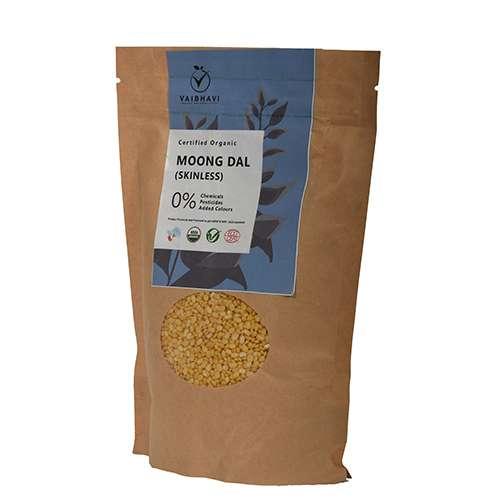MOONG DAL ( SKINLESS )
₹150.0
Moong dal is one of the most widely consumed legumes worldwide. Moong beans have been farmed in India from ancient times and hence, are native to the country. It is moong dall that has been hulled and…
| Category: | PULSES & GRAINS | Product Name: | MOONG DAL ( SKINLESS ) |
|---|---|---|---|
| MRP: | 150 | Expiry: | 12 Months |
| Weight: | 0.5 KG, | Special Feature: | Organic |
| HSN: | 07139010 | GST %: | 5% |
| Package Dimensions: | Brand: | Vaibhavi Natural | |
| Item Weight: | 0.5 KG, |
- Description
- Additional information
- Reviews (0)
- Q & A
- Sustainability Remark
- More Offers
- Store Policies
- Inquiries
Key benefits
· Minerals, vitamins, protein, and fiber are all present in abundance.
· Antioxidant concentration is high.
· Improves cardiovascular health by lowering LDL cholesterol levels.
· Blood pressure is reduced.
· Aids with weight loss and intestinal wellness.
· It is helpful during pregnancy.
· It’s simple to incorporate into your diet.
10 reasons to choose organic
- You choose crops that have more antioxidants and vitamins.
- You are having food that contains more nutrients.
- Organic food has no food additives like artificial sweeteners, preservatives, coloring, flavoring etc.
- You won’t expose yourself to pesticides, toxins, or antibiotic resistant bacteria.
- You’ll always experience the most natural taste of the product.
- You will be doing your part to keep this planet pollution free.
- You will be taking a right step towards sustainable environment
- Better to deal with soil by simply washing the produce then with chemicals in your body.
- You support a true economy.
- And you will align with our vision to support our farmers!
| brands | Vaibhavi Natural |
|---|---|
| Weight | 0.5 KG |
You must be logged in to post a review.
Q & A
Environmental Impact: Organic farming practices generally prioritize environmental sustainability. Organic beans and pulses are grown without the use of synthetic pesticides, genetically modified organisms (GMOs), or synthetic fertilizers. This reduces the potential for chemical runoff, soil erosion, and contamination of water sources, leading to a healthier ecosystem.
Soil Health: Organic farming emphasizes the use of natural methods to maintain soil fertility. Organic farmers employ techniques such as crop rotation, cover cropping, and composting, which enhance soil structure and increase its organic matter content. This promotes long-term soil health and reduces soil degradation, helping to sustain the productivity of land used for growing beans and pulses.
Biodiversity: Organic farming practices often support greater biodiversity compared to conventional methods. By avoiding the use of synthetic chemicals, organic farmers create a more favorable environment for beneficial insects, birds, and other wildlife. Additionally, organic farms typically preserve hedgerows, field margins, and natural habitats, which contribute to the overall ecological balance.
Water Conservation: Organic farming aims to minimize water consumption by employing efficient irrigation techniques and promoting soil moisture retention. By avoiding synthetic fertilizers, which can contribute to water pollution, organic bean and pulse production helps maintain the quality of water resources.
Social Aspects: While sustainability often focuses on environmental aspects, it also encompasses social considerations. Organic farming systems often prioritize fair trade practices, support local economies, and provide better working conditions for farmers and laborers. This contributes to sustainable livelihoods and equitable development.
Carbon Footprint: Organic agriculture generally has a lower carbon footprint compared to conventional farming due to reduced energy inputs and avoidance of synthetic fertilizers. However, the specific carbon emissions associated with organic beans and pulses can vary depending on factors such as transportation distances and farming practices. Locally sourced organic beans and pulses can further reduce the carbon footprint by minimizing transportation-related emissions.
Overall, organic beans and pulses can contribute to a more sustainable food system by promoting environmentally friendly practices, protecting biodiversity, conserving water resources, and supporting social well-being. However, it's important to note that sustainability is a complex and multifaceted concept, and there may still be challenges and areas for improvement within organic farming systems.
General Inquiries
There are no inquiries yet.



Reviews
There are no reviews yet.